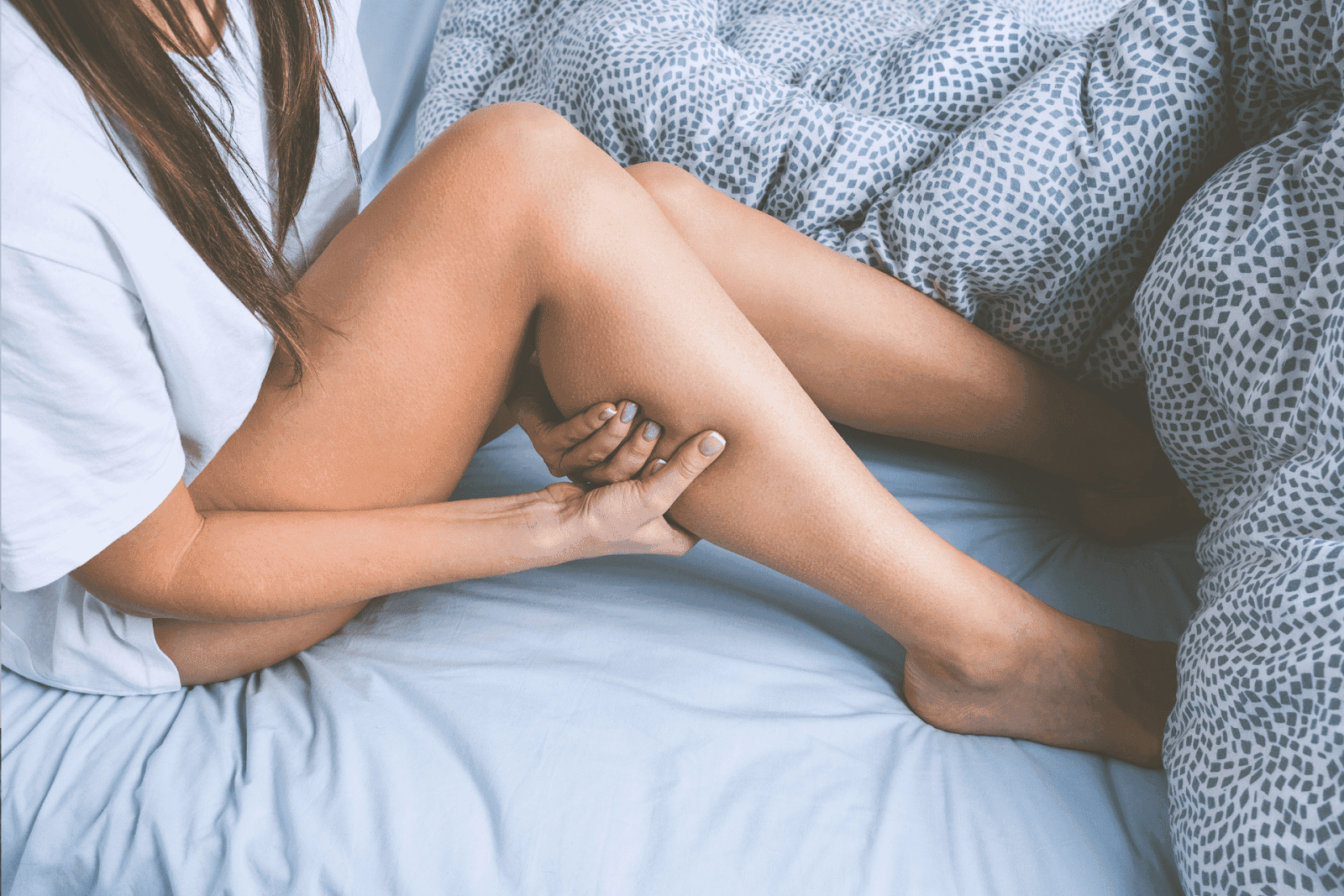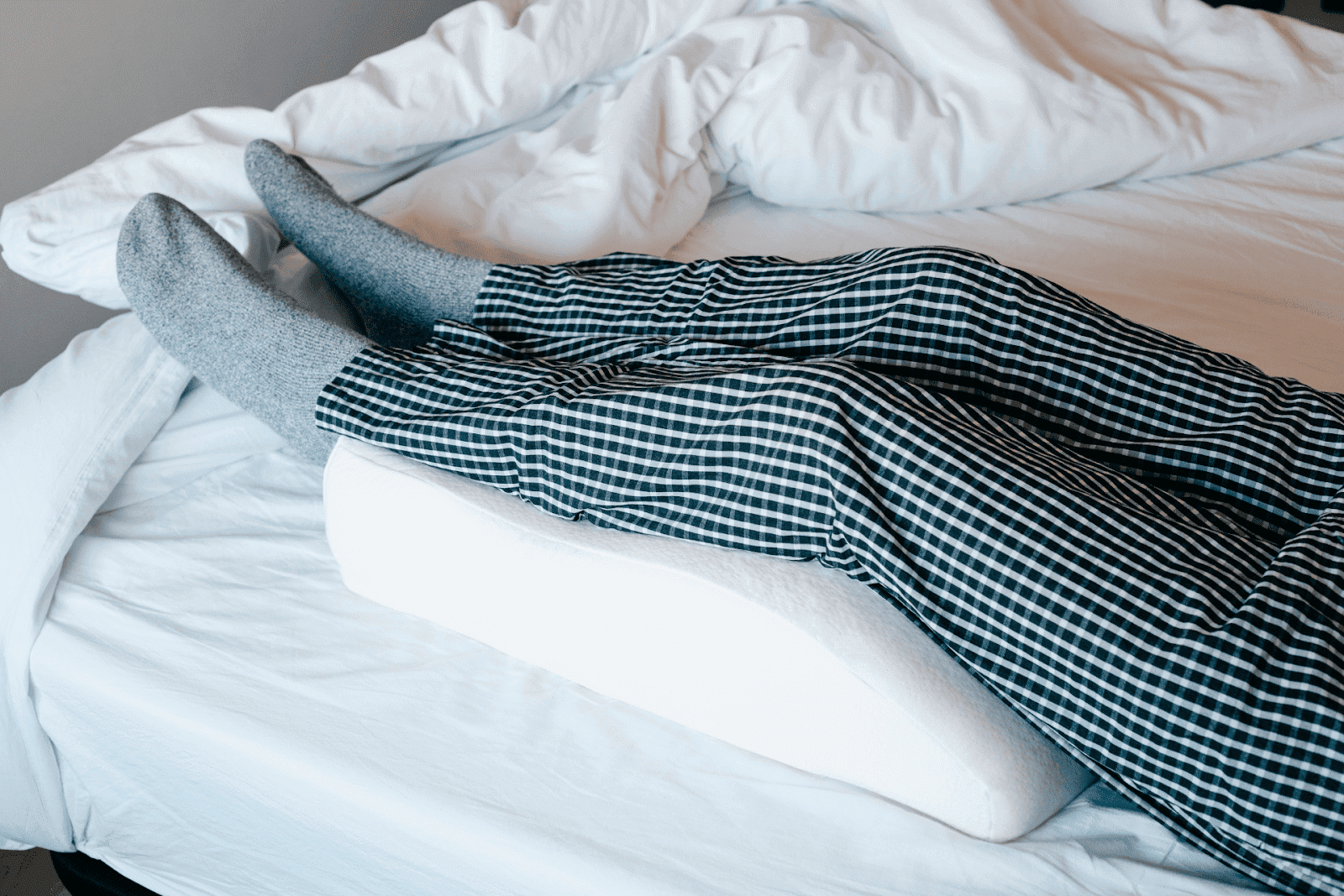Exercises for Lower Back Pain: What Helps Most
Why Movement Matters for Back Pain ReliefLower back pain affects millions of people every year. The good news is that the right exercises can make a real difference. Finding [...]
Read More
Medically reviewed by Alan Lucks | MD, Alan Lucks MDPC Private Practice - New York on October 12th, 2025.
Restless leg syndrome affects 7-10% of adults and typically worsens at night due to decreased dopamine levels, causing an irresistible urge to move the legs.
Peripheral artery disease reduces blood flow to extremities and causes cramping pain that improves with leg elevation above heart level for 15-20 minutes.
Magnesium deficiency contributes to muscle cramps in 75% of cases—supplementing with 200-400mg daily can reduce nighttime episodes within 2-4 weeks.
Compression socks with 15-20 mmHg pressure worn during the day improve circulation and can reduce nighttime pain by up to 60% in people with venous insufficiency.
Sciatica pain radiating from the lower back down the leg often responds to specific stretches like the piriformis stretch held for 30 seconds, repeated 3-4 times before bed.
Severe leg pain at night can be a distressing experience that disrupts sleep and affects overall quality of life. Whether caused by muscle cramps, nerve issues, or circulatory problems, understanding how to alleviate this discomfort is essential. This article explores effective strategies for managing severe leg pain during nighttime hours, helping you find relief and rest more comfortably.
Before diving into relief methods, it is important to understand the potential causes of severe leg pain that occurs at night. Common reasons include muscle cramps, restless leg syndrome, peripheral artery disease, and nerve-related conditions such as sciatica or neuropathy. Identifying the underlying cause can guide the most effective treatment approach.
Muscle cramps, often called “charley horses,” are sudden, involuntary contractions of muscles, frequently affecting the calves. These cramps can be triggered by dehydration, electrolyte imbalances, or prolonged inactivity. Factors such as excessive exercise, fatigue, or even sitting in one position for too long can exacerbate the likelihood of experiencing these painful spasms. Stretching before bedtime, staying hydrated, and ensuring a balanced intake of minerals like potassium and magnesium can help mitigate these cramps. Restless leg syndrome, a neurological disorder, causes uncomfortable sensations and an uncontrollable urge to move the legs, particularly at night. This condition can be exacerbated by factors such as stress, caffeine, and certain medications, making it crucial to evaluate lifestyle choices that may contribute to its severity.
Circulatory problems such as peripheral artery disease reduce blood flow to the legs, leading to pain and cramping. This condition is often linked to atherosclerosis, where arteries become narrowed due to plaque buildup, resulting in decreased oxygen supply to the muscles. Symptoms may worsen during periods of inactivity, making it essential for individuals to engage in regular physical activity to promote circulation. Nerve issues like sciatica result from irritation or compression of the sciatic nerve, causing sharp or burning pain radiating down the leg. This can be due to herniated discs, spinal stenosis, or other spinal conditions that place pressure on the nerve roots. Understanding these causes is key to selecting appropriate relief techniques. Additionally, lifestyle modifications, such as maintaining a healthy weight and practicing good posture, can play a significant role in alleviating nerve-related pain and improving overall leg health.
 Immediate Relief Techniques for Nighttime Leg Pain
Immediate Relief Techniques for Nighttime Leg PainOne of the quickest ways to ease leg pain caused by cramps or muscle tightness is gentle stretching. Simple calf stretches or flexing the foot upwards can help relax the muscle and reduce cramping. Walking around briefly may also improve circulation and relieve discomfort. Additionally, incorporating yoga or tai chi into your routine can enhance flexibility and promote overall muscle relaxation, which may help prevent future occurrences of leg pain during the night. These practices not only stretch the muscles but also encourage mindfulness and relaxation, which can be particularly beneficial before bedtime.
Using a warm compress or heating pad on the affected area can soothe muscle spasms and promote blood flow. Alternatively, cold packs may reduce inflammation and numb sharp pain. Experimenting with heat or cold therapy can help determine which provides the most relief for your specific condition. It's also worth noting that alternating between heat and cold can be an effective strategy; the warmth can help relax the muscles while the cold can reduce swelling and pain, creating a balanced approach to treatment. For added comfort, consider using essential oils such as lavender or eucalyptus in conjunction with heat therapy, as their soothing scents can enhance relaxation and improve your overall experience.
Dehydration and low levels of electrolytes such as potassium, magnesium, and calcium often contribute to muscle cramps. Drinking water throughout the day and consuming foods rich in these minerals can prevent nighttime leg pain. In some cases, electrolyte supplements may be recommended by a healthcare provider. Furthermore, incorporating foods like bananas, spinach, and yogurt into your diet can significantly boost your electrolyte levels. It's also beneficial to monitor your caffeine and alcohol intake, as both can lead to dehydration and exacerbate muscle cramps. By maintaining a balanced diet and staying properly hydrated, you can create a strong foundation for muscle health, potentially reducing the frequency and severity of nighttime leg pain.
Maintaining an active lifestyle with regular exercise strengthens muscles and improves circulation, reducing the likelihood of leg pain at night. Incorporating stretching exercises, especially before bedtime, can keep muscles flexible and less prone to cramping. Activities such as yoga or Pilates not only enhance flexibility but also promote mindfulness, which can alleviate stress that may contribute to muscle tension. Additionally, low-impact exercises like swimming or cycling can be particularly beneficial, as they provide cardiovascular benefits without putting undue stress on the joints. Engaging in these activities consistently can lead to long-term improvements in leg health and overall well-being.
How you position your legs during sleep can influence pain levels. Elevating the legs slightly with pillows may enhance blood flow and reduce pressure. Using supportive mattresses and avoiding positions that compress nerves or restrict circulation can also help prevent discomfort. It may also be advantageous to invest in specialized pillows or cushions designed to support the legs and lower back, which can further enhance comfort during sleep. Experimenting with different sleeping positions, such as lying on your side with a pillow between your knees, can help maintain proper alignment and reduce strain on the legs. Understanding your body’s unique needs can lead to a more restful night and less pain in the morning.
 Addressing Underlying Medical Conditions
Addressing Underlying Medical ConditionsChronic leg pain at night may signal an underlying health issue such as diabetes, vascular disease, or nerve damage. Managing these conditions with the guidance of a healthcare professional is crucial. Regular check-ups and appropriate treatments can significantly reduce nighttime leg pain. Furthermore, lifestyle modifications such as dietary changes, weight management, and smoking cessation can play a pivotal role in managing these conditions. For instance, a diet rich in antioxidants and anti-inflammatory foods can support vascular health, while maintaining a healthy weight can alleviate pressure on the legs. Staying informed about your health and actively participating in your treatment plan can empower you to take control of your leg pain and improve your quality of life.
If severe leg pain persists despite home remedies or if it is accompanied by symptoms such as swelling, redness, numbness, or weakness, it is important to consult a medical professional. Early diagnosis and treatment can prevent complications and improve outcomes.
For convenient and affordable access to medical advice, consider using telehealth services like Doctronic.ai. Doctronic offers 24/7 video visits with licensed doctors across all 50 states for under $40. Their AI-powered platform provides fast, personalized care drawing on the latest medical research, making it easier than ever to get expert guidance from the comfort of your home.
Doctronic’s AI doctor can also provide a free initial diagnosis online, helping you understand potential causes of your leg pain and whether urgent care is necessary. With over 10 million users, Doctronic is revolutionizing direct-to-patient care by combining cutting-edge AI with human medical expertise. Visit Doctronic.ai today to explore your options for managing severe leg pain at night.
A diet rich in fruits, vegetables, whole grains, and lean proteins supports overall vascular and nerve health. Foods high in antioxidants and anti-inflammatory properties can help reduce pain and promote healing.
Both caffeine and alcohol can contribute to dehydration and interfere with sleep quality, potentially worsening leg pain at night. Moderation is key to minimizing these effects.
Stress can exacerbate pain perception and muscle tension. Techniques such as meditation, deep breathing, or gentle yoga may help relax the body and reduce nighttime leg discomfort.
Severe leg pain at night is a common issue that can stem from various causes, including muscle cramps, nerve problems, and circulatory conditions. Immediate relief can often be achieved through stretching, heat or cold therapy, and hydration. Long-term prevention focuses on regular exercise, proper sleep positioning, and managing underlying health issues.
When pain is persistent or severe, seeking medical advice is essential. Telehealth services like Doctronic.ai provide accessible, affordable, and expert care to help diagnose and treat leg pain effectively. By combining practical self-care with professional guidance, it is possible to reduce nighttime leg pain and improve overall well-being.
If you're struggling with severe leg pain at night and need immediate, personalized medical advice, Doctronic is here to help. As the #1 AI Doctor, we offer free AI doctor visits that provide you with a quick and accurate diagnosis, which you can then take to any doctor for further assistance. For more direct care, our telehealth video visits connect you with our own doctors 24/7 in all 50 states, all for less than $40. With over 10 million satisfied users, Doctronic is changing the game in direct-to-patient care, offering faster, smarter, and more personal medical consultations. Skip the line. Talk to an AI Doctor Now, for free.
Most nighttime leg pain stems from treatable causes like mineral deficiencies, poor circulation, or nerve compression that respond well to targeted interventions. Combining immediate relief techniques with addressing underlying causes provides the best long-term results. If you're experiencing persistent leg pain that disrupts your sleep, Doctronic can help you identify the root cause and develop an effective treatment plan.
Why Movement Matters for Back Pain ReliefLower back pain affects millions of people every year. The good news is that the right exercises can make a real difference. Finding [...]
Read MoreWhat Tech Neck Is and Why It’s So CommonYour neck was not designed for smartphones. The human spine evolved over millions of years to support a head positioned directly above [...]
Read MoreWhat Women Need to Know About Perimenopause SupportThe menopause supplement market has grown rapidly in recent years, reflecting a clear trend: millions of women are actively [...]
Read More